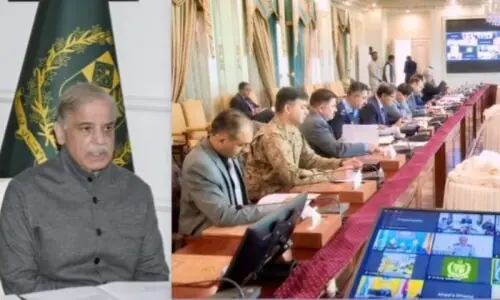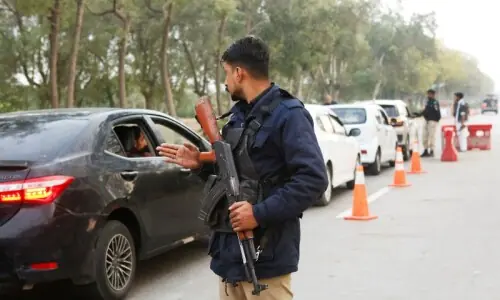AFTER the hype surrounding last year’s trip, Gen Raheel Sharif’s second visit to Washington DC as army chief was more workmanlike in tone. Following civil-military tensions that erupted in the run-up to Gen Sharif’s trip, it appears both the American hosts and their Pakistani visitor want to send a signal that the security-focused talks were not meant to sideline the political government. They only partly succeeded. The official White House readout on Gen Sharif’s meeting with US Vice President Joe Biden referred to Prime Minister Nawaz Sharif’s breakfast meeting with Mr Biden on Oct 22 and seemed to suggest that this week’s visit was a follow-up. But such elliptical messages can only go so far. A far more powerful signal would have been sent if the two trips had been merged and the prime minister and army chief travelled to the US together. While there may be problems of protocol with a joint trip and Gen Sharif has specialised military issues to discuss with his American counterparts, a joint set of meetings would have signalled that the civilian set-up is not considered peripheral to national security and foreign policy.
Yet, there are undeniably important bilateral issues to be discussed regardless of the state of civil-military relations inside Pakistan. While details are scarce — the ISPR has offered only the barest of outlines regarding the various meetings and US officials have been similarly reticent — it is likely that the results of the discussions will start to be felt in the weeks and months ahead. Most obviously, given the uptick in activity surrounding the resumption of stalled talks in Afghanistan, there could be some kind of fresh push for peace negotiations. With the Pakistani state having demonstrated its bona fides when it comes to making talks a possibility, perhaps it is time for the outside powers to take Pakistan’s concerns more seriously. While Afghan President Ashraf Ghani still appears to be a potentially credible peace partner, Pakistan has legitimate complaints when it comes to the actions and rhetoric of the more hawkish elements in the Afghan state apparatus. From better border management to curbing the activities of anti-Pakistan militants in Afghanistan to working with Pakistan to nudge the Taliban to the negotiating table, it is also counterproductive to put the full weight of expectation on this country alone. If stability in the region is to be a shared goal, then achieving it must be a shared responsibility.
Lessons must also be learned from the abortive talks between the Afghan government and the Afghan Taliban earlier this year. There is a fine line between encouraging the process of talks and rushing it. Immediate breakthroughs are unlikely and the process is likely to be very frustrating for all sides. Hopefully, Gen Sharif and US officials are working towards a road map for a sustained reconciliation process in Afghanistan.
Published in Dawn, November 22nd, 2015




























